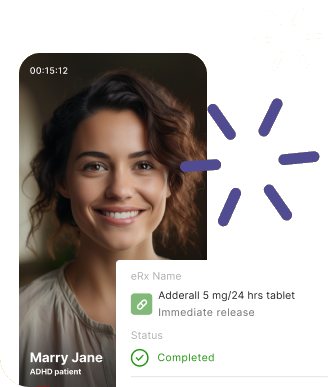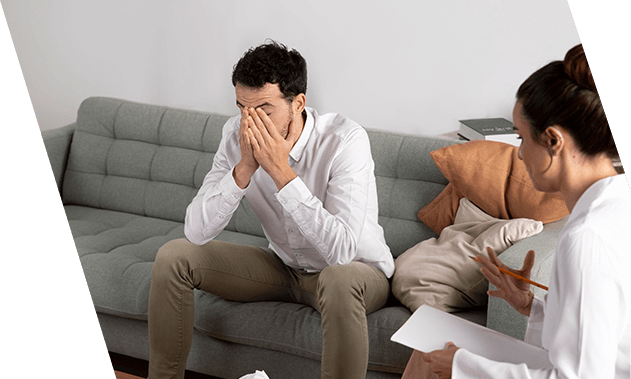Valium has a
Brand name: Valium
Generic name: Diazepam
Medication class: Benzodiazepine
Dosage forms: Oral tablets
FDA-approved uses: Anxiety disorders
An annual
However, if stress and anxiety become overwhelming, it’s wise to seek professional support. In the case of a chronic anxiety disorder, many treatments are available, such as psychotherapy or medication, including Valium. Read on to learn more about this medicine, its uses, side effects, and whether it may be an appropriate treatment option for you.
Highlights
- Valium (diazepam) is a prescription medication used to treat anxiety disorders for short periods of time.
- Valium may cause side effects, including serious ones, so it’s important to take it exactly as prescribed by your healthcare provider.
- Valium can be prescribed online if it’s considered the right treatment option. Licensed professionals at MEDvidi can legally prescribe Valium online following a medical evaluation.
- Ongoing follow-up care and dosage adjustments are needed to ensure your treatment is safe and effective.
What Is Valium?
Valium (diazepam) belongs to the class of medications called
When Is Valium Used?
Valium is


How Does Valium Work?
Valium is a long-acting central nervous system (CNS) depressant. It works by boosting the effect of a calming chemical in the brain called GABA (gamma-aminobutyric acid). This helps slow down the activity of overactive nerves, which in turn reduces feelings of anxiety while also promoting muscle relaxation.
Do You Need a Prescription for Valium (Diazepam)?
Yes, Valium is a prescription medication, which means you need a valid prescription from a licensed healthcare professional to get it. As with other benzodiazepines, it has a high risk for dependence and misuse. Doctors will typically only prescribe Valium for short-term use and with close monitoring. Getting Valium without a prescription is not only unsafe but also illegal.

Who Can Prescribe Valium?
Only licensed medical professionals are authorized to prescribe Valium. In the United States, this can include:
- Psychiatrists
- Primary care physicians (PCPs)
- Physician assistants (PAs)
- Nurse practitioners (NPs)
How to Get Valium Prescribed Online?
Doctors typically prescribe Valium online for patients with a diagnosed anxiety disorder, not in the case of mild anxiety symptoms. It is one of the many medications used for anxiety treatment, but a healthcare provider may choose another suitable option during the consultation. Here is what’s involved in the process if you see a medical professional through MEDvidi:
Step 1. Sign Up and Book an Appointment
To start the process, create an account on MEDvidi. You will be asked to complete an intake form and provide the required documentation. After your patient profile is created, you can then book an appointment online at a time that is convenient for you. Scheduling with MEDvidi is quick and hassle-free thanks to our easy-to-use online platform.
Step 2. See a Healthcare Provider and Get Treatment Recommendations
You’ll meet with a provider in your state through an online video call. During your call, your provider will take time to understand your mental health concerns by talking with you about your symptoms and how they’ve been affecting your life. You may also be asked to complete a brief questionnaire to help assess your anxiety more accurately. They’ll review your full medical history, including any current or past health issues, allergies, and all the medications or supplements you’re currently taking.
After this evaluation, your provider will determine whether using Valium for anxiety is a suitable option for you. If they think another treatment might work better or be safer, they may recommend a different medication, therapy, or lifestyle changes to help you feel your best.
Step 3. Receive a Prescription and Pick-Up Medication from pharmacy
If your provider decides that Valium is a good choice for you, they’ll send the prescription electronically to a pharmacy of your choice. You’ll also get clear instructions on when and how to pick it up.
It’s very important to take Valium exactly as your provider prescribes. Never change your dose or take it more often than directed, even if you feel like it’s not working fast enough. Valium can be habit-forming, and misusing it increases the risk of side effects or dependence. Let your provider know right away if you experience any unusual symptoms, such as extreme drowsiness, confusion, mood changes, or trouble breathing.
Step 4. Follow-Ups and Refills
After you start taking the medication, your provider will want to check in to see how well it’s easing your anxiety and whether you’re having any side effects. MEDvidi makes staying on track simple with easy-to-schedule virtual follow-ups at your convenience. During your follow-up appointments, you can also discuss prescription refills if you and your doctor determine Valium is working well to treat your anxiety.


Who Should Not Take Valium
While Valium is an effective treatment option for anxiety and other conditions, it isn’t for everyone. Certain people shouldn’t take Valium, including those with:
- Known sensitivity or allergy to Valium. If you’ve had a previous reaction to diazepam or Valium, you shouldn’t take it again.
- Severe liver disease. If you have severe liver disease, your body isn’t able to get rid of Valium as it usually should, increasing your risk of side effects.
- Myasthenia gravis. Myasthenia gravis is a condition that can cause extreme muscle weakness and tiredness. People with myasthenia gravis shouldn’t take Valium.
- Severe breathing problems. Because Valium can make it more difficult to breathe, people with severe breathing issues shouldn’t use Valium. Individuals with respiratory conditions, such as asthma or chronic obstructive pulmonary disease (COPD), should be closely monitored while taking this medication.
- Sleep apnea. If you have sleep apnea, your doctor is likely to not prescribe you Valium due to the increased risk of dangerous side effects.
- Acute narrow-angle glaucoma. If you have glaucoma, talk with your doctor before taking Valium. While some patients with open-angle glaucoma can use Valium, it should not be used in people with narrow-angle glaucoma.
- Substance use disorders. Taking Valium can increase the risk of abuse and misuse. Talk with your doctor if you have a history of substance abuse.
In addition, women who are pregnant or breastfeeding shouldn’t take Valium and have to discuss safer treatment alternatives with their physician.
Note that this may not be a comprehensive list of who should not take Valium, so it’s essential to share your health history and any current medication, supplements, or herbs with your healthcare provider, so they can make sure the medication is safe for you.
Dosage
When treating anxiety, the usual dose of Valium is between 2 mg and 10 mg, taken 2 to 4 times a day. Your doctor will likely start with a lower dose and gradually increase the dose as needed to best treat your anxiety.
Talk with your doctor if you decide you’d like to stop taking Valium. Suddenly stopping it can cause withdrawal symptoms, including nausea, tremors, heart palpitations, trouble sleeping, irritability, or panic attacks. In some cases, symptoms can be severe, particularly if you have been taking a high dose of Valium or taking it for an extended time. Your doctor will instruct you on how to gradually reduce your dose.
Side Effects
As with other medications, Valium can cause side effects, which may go away during treatment as your body adjusts to the medicine. Common side effects include:
- Dizziness
- Drowsiness
- Confusion
- Fatigue
- Muscle weakness
- Mood changes
- Problems with coordination or muscle control
- Changes in appetite
- Hypotension (low blood pressure)
Severe side effects of Valium are uncommon but can be serious and require immediate medical attention. These may include:
- Respiratory depression (slow or shallow breathing), especially when combined with other central nervous system depressants like opioids or alcohol.
- Hallucinations, delusions, aggressiveness, or restlessness.
- Depressed mood, suicidal thoughts, or unusual behavioral changes.
- Seizures, especially in people with a history of seizure disorders or who suddenly stop taking diazepam.
- Allergic reactions, such as rash, itching, swelling (especially of the face, tongue, or throat), severe dizziness, or trouble breathing.
- Jaundice (yellowing of the skin or eyes), which may indicate liver problems.
Note that this may not be a complete list of possible side effects of Valium; if you experience new or worsening side effects while taking it, it’s important to talk with your healthcare provider. Seek medical attention immediately if you experience serious side effects, such as confusion, slow or shallow breathing, extreme drowsiness, or changes in your mood. Signs of a life-threatening allergic reaction, including swelling of the face or throat, rash, or trouble breathing, are medical emergencies. Call 911 or go to the nearest emergency room immediately.
Interactions With Other Medications
Valium interacts with several medications, which may increase the risk of side effects. Combining Valium with other CNS depressants, such as opioids, alcohol, sleep aids, or other benzodiazepines, can result in drowsiness, dizziness, slowed breathing, or impaired coordination. In severe cases, it can lead to excessive sedation, respiratory depression, or even coma. Discuss with your healthcare provider any medications you are currently taking, as well as any new prescription or over-the-counter medications, herbs, or supplements you plan to start.
Important Safety Notes
Avoid Alcohol
Valium (diazepam) can cause your brain to function more slowly, which may impact your judgment, thinking, and coordination. While taking this medication, it’s important to avoid alcohol or other substances that also slow down brain activity, as combining them can be dangerous. You shouldn’t drive, use heavy machinery, or do anything that requires you to be fully alert until you know how Valium affects you.
Follow Dosage Instructions
Do not adjust your dose, skip doses, or stop taking diazepam without first consulting your healthcare provider, even if you start to feel better. If you miss a dose, take it as soon as you remember unless it’s close to the time for your next dose. In that case, skip the missed dose and resume your regular schedule. Never take two doses at once to make up for a missed one.
Remember Basic Safety Recommendations
Store your medication securely at room temperature, away from heat, moisture, and direct sunlight. Keep it out of reach of children and pets. Never share your prescription with anyone, even if they have similar symptoms, as Valium may not be safe or appropriate for them.
Never buy Valium online without a valid prescription or from unlicensed sources. Unregulated online pharmacies may sell counterfeit or contaminated products that can be ineffective or dangerous. These products may be completely different substances, contain incorrect dosages, or harmful additives. Additionally, taking Valium without medical supervision increases the risk of misuse, overdose, drug interactions, and withdrawal complications. Always obtain medications through a licensed healthcare professional and a
Cost and Insurance Coverage
The cost of Valium can vary widely depending on whether you’re purchasing brand-name Valium or the
With health insurance, the cost is typically much lower, especially for the generic form. Many insurance companies cover generic diazepam, but coverage for brand-name may be limited or require prior authorization. Your copay or coinsurance will depend on your specific plan and formulary tier.
If you don’t have insurance or your plan doesn’t cover the medication, consider using a prescription discount card or online coupon programs, such as GoodRx, SingleCare, or RxSaver. Keep in mind that prices can vary by pharmacy, so it’s a good idea to shop around for the best deal.
Valium vs Other Treatments for Anxiety
Alternative medications to treating anxiety include the following:
- Selective serotonin reuptake inhibitors (SSRIs): Prozac (fluoxetine), Zoloft (sertraline), Lexapro (escitalopram)
- Selective-norepinephrine reuptake inhibitors (SNRIs): Cymbalta (duloxetine)
- Buspirone
- Other benzodiazepines: Xanax (alprazolam), Klonopin (clonazepam)
Valium starts working faster than some other anxiety medications: it reaches



How to Talk to Your Provider About Anxiety Treatments
To choose the right treatment, your provider will want to know about your symptoms, so be prepared to explain them in detail. Also, tell your provider when the symptoms began, how often they occur, how severe they are, and how they affect your daily life.
You may also want to take the time to think about questions you may have about Valium. Some examples include:
- Is Valium safe to take with my other medications?
- What are the most common side effects?
- When should I contact you if I have side effects?
- How long should I expect to take Valium?
- How do I know Valium is working or not working for me?
- Should I do anything specific in addition to taking Valium to deal with anxiety?
Conclusion
Valium can be effective as a short-term treatment for relieving symptoms of anxiety. It also has potential side effects and risks, so it’s important to follow your healthcare provider’s instructions on the dosage and proper use. After a video consultation and discussion with your provider, they can determine the best treatment. Contact us to speak with a qualified medical professional at MEDvidi and receive a personalized treatment plan for anxiety online.
Frequently Asked Questions
Is Valium still prescribed today?
Yes, it is a common prescription medication for anxiety treatment. Your healthcare provider can determine whether Valium is a suitable treatment option based on your medical and mental health history, as well as your symptoms.
Who can prescribe Valium?
Any licensed healthcare provider, including doctors, psychiatrists, and PAs, can prescribe Valium.
Can MEDvidi doctors prescribe controlled substances?
Yes, MEDvidi doctors can prescribe controlled substances, but only after a full evaluation. Only healthcare providers licensed in your state can provide prescriptions, including for controlled substances.
Can I receive a Valium prescription while on Suboxone treatment?
Concurrent use of Suboxone and benzodiazepines like Valium













